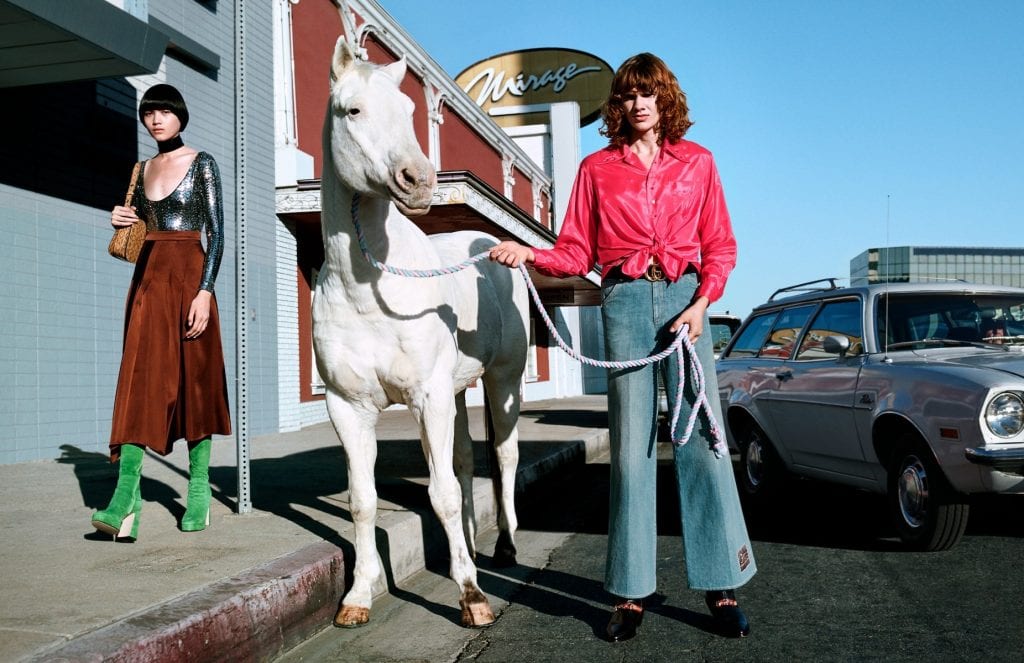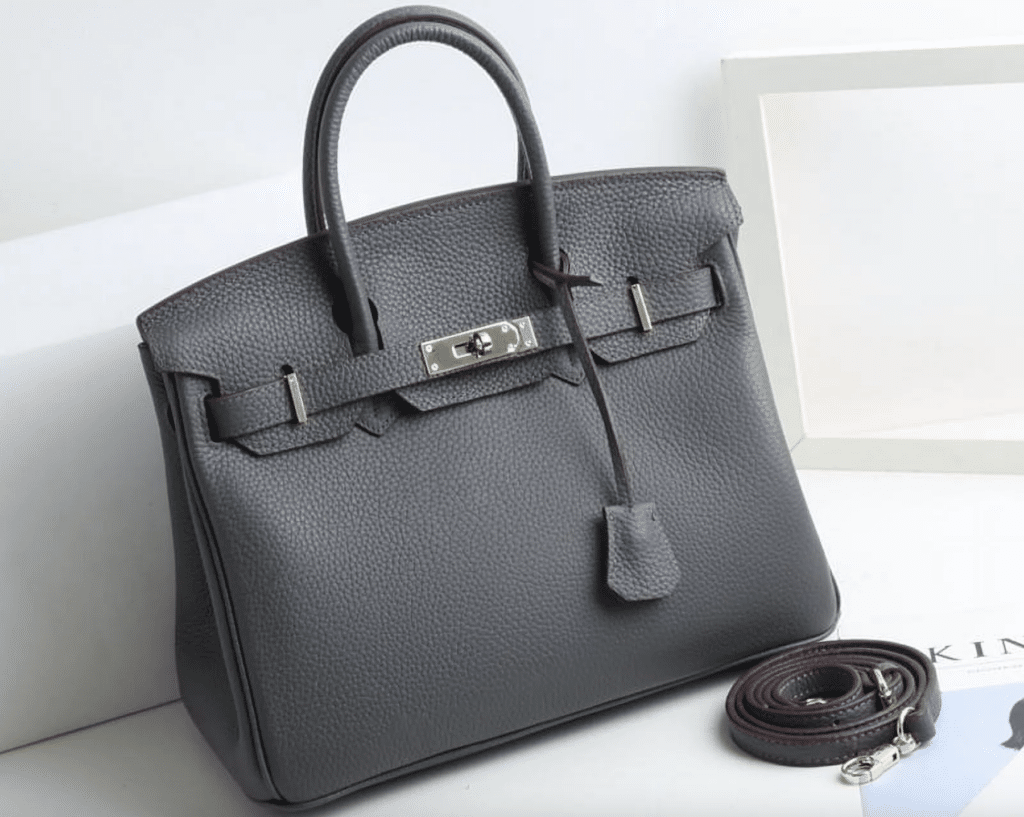Gucci is launching not one but two flagship stores on Alibaba’s online luxury shopping platform, the Kering-owned brand and the Chinese e-commerce titan announced on Friday. The first of the two e-shops – which will give Chinese consumers access to the Italian fashion company’s coveted ready-to-wear and accessories offerings – is slated to open its digital doors on Monday, followed by a second, beauty goods-centric web outpost to follow in February 2021 under the watch of Gucci beauty licensee Coty, Inc. According to a number of media reports, the debut of Kering’s marquee brand on Alibaba signals that its “struggle for legitimacy in the luxury world has now been fully realized.”
The Gucci-Alibaba tie-up news “underscores the importance of the Chinese market for high-end brands seeking to reverse a revenue slide due to the coronavirus pandemic,” Reuters reported on Friday, pointing to the fact that Chinese customers “represented around 35 percent of luxury goods purchases before the pandemic,” and are on track to account for a nearly half of all personal luxury goods sales by 2025, according to Bain & Co.’s estimations.
But beyond being a very-clear-indicator of where brands are focusing their energy post-pandemic (i.e., China), and where Alibaba currently stands in the often-rigid luxury fashion ecosystem, the newly-announced partnership is striking in that it comes just a few years after the back-to-back lawsuits that Gucci’s parent company Kering filed against Alibaba, accusing the Hangzhou, China-headquartered internet goliath of knowingly and actively enabling counterfeiters to sell their products on its sweeping platforms, and thereby, directly profiting from the sale of counterfeit goods.
Kering v. Alibaba x 2
The respective giants’ legal squabble got its start in July 2014 when Kering filed a headline-making lawsuit against Alibaba in a New York federal court, accusing the American arm of the Jack Ma-founded online group of being complicit in the sale of fake handbags, watches, and other items on its marketplace sites in a manner that Kering characterized as “racketeering.”
Pointing to a slew of “obviously fake Gucci products,” which were being offered up in wholesale and retail capacities on Taobao, Kering called foul, and alleged that the “specifically identifiable counterfeit products could not be sold without [Alibaba’s] assistance, but instead of shutting down the counterfeiters, the Alibaba defendants seek to profit from the counterfeiters’ blatant violations.” In addition to providing a marketplace for the sale of counterfeit (or otherwise trademark-infringing) goods, Alibaba was in the business of “selling keywords to counterfeiters that include the names of Kering brands, allowing the merchants to attract more customers to buy fake goods that bear the brands,” Kering alleged, as the Wall Street Journal reported at the time.
Ultimately, “the Alibaba defendants knowingly assist these counterfeiters in virtually all aspects of their illegal operations,” Kering argued, seeking unspecified damages and injunctive relief from Alibaba and a number of affiliated defendants.
Alibaba and Kering managed to settle the strongly-worded suit out of court within a mere two weeks of its filing date, with Alibaba insisting that it was enforcing a “zero tolerance policy” towards fakes, and agreeing to team up with Kering in an effort to keep counterfeit versions of the offerings of the Paris-based luxury goods group’s brands, including Gucci, Balenciaga, Saint Laurent, and Bottega Veneta, off its platforms.
The settlement did not last long, and less than a year after the two companies had seemingly made peace, Kering waged legal action against Alibaba again. In the subsequently-filed lawsuit in May 2015, which named Alibaba and a number of individual marketplace vendors as defendants, Kering argued that Alibaba was not holding up its end of the bargain, and that it “knowingly encourage[d], assist[ed], and profit[ed] from the sale of counterfeits on their online platforms … [and] made it possible for an army of counterfeiters to sell their illegal wares throughout the world.”
Meanwhile, Alibaba denied the merit of Kering’s case, arguing that it maintains a “strong track record” of helping brands fight counterfeits. “Unfortunately, Kering Group has chosen the path of wasteful litigation instead of the path of constructive cooperation. We believe this complaint has no basis and we will fight it vigorously,” a spokesman for Alibaba said when Kering filed the second suit.
Despite Jack Ma’s vow not to settle the case, Kering and Alibaba again worked out their differences out of court. However, this time around, the settlement took longer than two weeks, and in fact, it came after Judge Kevin Castel of the U.S. District Court for the Southern District of New York dismissed Kering’s racketeering claims, and then a few days later, granted Kering’s motion for a temporary restraining order, thereby, prohibiting numerous Taobao vendors – who had been named specifically in Kerning’s complaint as among those selling counterfeit goods on Alibaba’s platform – from operating their individual web stores.
Speaking about the August 2017 settlement, which saw the two companies establish a joint task force with “the purpose of collaborating fully, exchanging useful information, and working closely with law enforcement bodies to take appropriate action against infringers of Kering’s brands identified with Alibaba’s advanced technology capabilities,” a representative for Kering called it “a milestone in both parties’ investment and efforts to protect brands’ intellectual property rights.”
Winning Over Luxury Brands
The migration of luxury and high fashion names onto Alibaba’s platform is noteworthy given the group’s public struggle with the sale of counterfeit goods on its various sites. Since the settlement of the Kering cases, Alibaba has increasingly found favor among a growing number of brand owners, enticing no small number of big-name luxury entities to list on its three-year-old Tmall-specific Luxury Pavilion – with the likes of Valentino, Versace, Burberry, Givenchy, Stella McCartney, and Chanel Beauty, among others, using the platform to reach high-spending Chinese consumers.
Alibaba’s success is likely due, at least in part, to the fact that it has been widely regarded as making significant strides in recent years when it comes to intellectual property enforcement, which has likely alleviated some resistance by brands to partner with the Chinese behemoth.
In the midst of the Kering lawsuits, for instance – which coincided with Alibaba’s TaoBao platform repeatedly being named in the U.S. Trade Representative’s “Notorious Markets” list, an annual government report that “highlights prominent and illustrative examples of online and physical markets that reportedly engage in or facilitate substantial piracy or counterfeiting,” the group revealed that it had begun tightening controls on the sales of luxury goods, in particular, on its sites. Such actions ranged from requiring sellers to show proof of authenticity for the products they list to engaging in what it called “productive and results-oriented relationships with brands, governments, and all industry partners.”
(Alibaba “made inroads in convincing the U.S. that it is fighting counterfeits,” the New York Times stated in 2015, noting that “in 2012, the U.S. trade representative removed Taobao from its list of ‘notorious markets’ based on what it said was progress that the company had made in cleaning up its sites. The removal of Taobao from the list came shortly after the company hired James Mendenhall, a general counsel for the trade representative’s office during the administration of President George W. Bush, to lead the company in talks over intellectual property rights with the U.S. government.” Alibaba’s Taobao platform, which is distinct from its more upscale Tmall site, was re-added to the U.S. trade representative’s list in 2016, where it remains).
More recently, the group announced the launch of “a proprietary and patented suite of technologies, such as artificial intelligence, cloud computing and block chain, to enhance the proactive monitoring of potential infringing activities on its platforms,” with such big data and artificial intelligence capabilities leading to “continued success” in the fight against fakes, according to Alibaba’s 2020 Intellectual Property Rights Report.
At the same time, in late 2015, the group enlisted former Apple director of Global Intellectual Property Enforcement, Matthew Bassiur, to a similar role to “advance [the group’s] anti-counterfeiting and intellectual property rights protection efforts.” After four years on the job, Bassiur told TFL in 2019 that “no expense is being spared when it comes to putting the right technology in place,” and setting up dedicated teams to police Alibaba’s platforms for fakes. Bassiur also pointed to increased levels of collaboration with external stakeholders – including via its Alibaba Anti-Counterfeiting Alliance, a group that was formed in 2017 to enable Alibaba to partner with brands, such as adidas, Burberry, Canada Goose, Louis Vuitton, Ralph Lauren, and Valentino, among others, to combat counterfeits – as having a strong hand in furthering the group’s ability to rid its sites of black market products.
While the results of Alibaba’s intellectual property-specific efforts are regularly touted in its annual reports (i.e., “96 percent of proactively removed listings were eliminated before a single sale took place” in 2019, and “there was a 57 percent year-over-year decrease in the number of listings removed in response to consumer reports of suspected counterfeits”), they are also seemingly being reflected in the big-name brands that Alibaba has been able to enlist for its Tmall platform. And Kering-owned Gucci is, of course, a striking example, having gone from back-to-back litigations with Alibaba to the group’s newest luxury partner.
But beyond its resource-intensive efforts to clean up its sites, Alibaba likely has something else to thank for its ability to lure brands to its site, as well, that cannot be overlooked or undersold: its willingness to concede control to the brands, themselves, to dictate everything from the pricing to the marketing of their products on the Luxury Pavilion site.
Speaking about the Luxury Pavilion site this fall, Christina Fontana, who heads luxury and fashion for Tmall in the U.S. and Europe, said that the platform “is really unique worldwide because it is the only place and the only platform I know of where brands have 100 percent control over everything: They pick the price. They pick the merchandising strategy. They pick the communication strategy.”
More than giving brands like Gucci the ability to dictate the consumer experience on its luxury-specific site, which is notably separate from Alibaba’s more mainstream TaoBao marketplace, Alibaba says that it gives brands access to a “rich set of technologies to create the look, feel and experience they want their consumers to have.” This is a critical element for image-conscious luxury brands, and one that is actively allowing Alibaba to make strides in the luxury space that would have been otherwise unimaginable just five years ago, alongside its efforts to police its sites for fakes.
It will be interesting to see if Amazon is able to successfully follow suit with its own recently-launched luxury venture. As we noted this fall, from its large-scale (and enduring) public relations push – which is almost certainly aimed at chipping away at mounting criticism by regulators, legislators, and consumers, alike, in connection with its role in the widespread availability of counterfeits, and bolstering confidence in the $1 trillion company – to its own anti-counterfeiting efforts like Project Zero and collaborations up with brands, such as Italian fashion house Valentino, to initiate counterfeit litigation, Amazon appears to be looking to take a page from Alibaba’s book on how to turn itself around both in terms of handling IPR issues, and winning brand (and consumer) trust.











